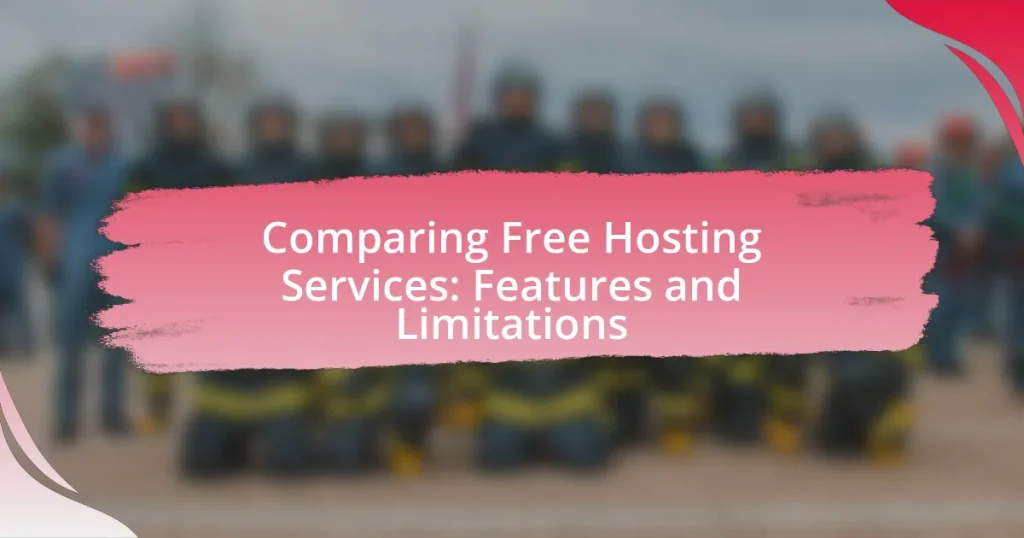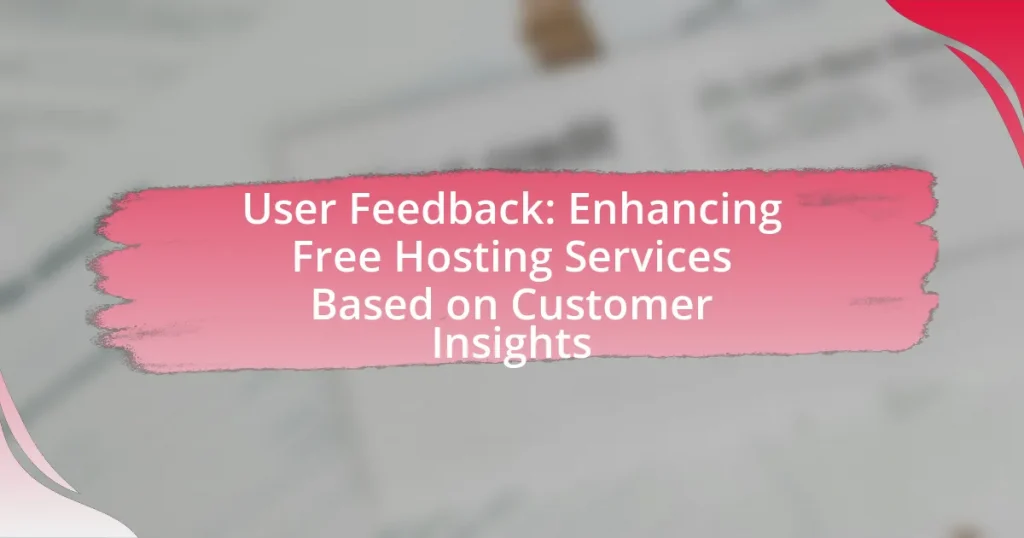Free hosting services are platforms that allow users to host websites without incurring costs, typically offering limited resources and often including advertisements. This article compares free hosting services with paid options, highlighting differences in features, performance, and customer support. It examines common features and limitations of free hosting, such as restricted storage and bandwidth, and discusses user motivations for choosing these services. Additionally, the article outlines best practices for maximizing the benefits of free hosting while addressing potential risks and strategies to mitigate limitations.

What are Free Hosting Services?
Free hosting services are platforms that provide website hosting without charging users a fee. These services typically offer limited resources, such as storage space and bandwidth, and may include advertisements on hosted sites. According to a 2021 report by HostingAdvice, free hosting options often come with restrictions that can affect website performance and functionality, making them suitable primarily for personal projects or small-scale websites.
How do free hosting services differ from paid options?
Free hosting services differ from paid options primarily in terms of features, performance, and support. Free hosting typically offers limited storage, bandwidth, and functionality, often including advertisements on user sites, while paid hosting provides greater resources, enhanced performance, and additional features such as custom domain names and SSL certificates. For instance, a study by HostingAdvice in 2021 indicated that paid hosting services can offer up to 99.9% uptime compared to the often lower reliability of free services. Furthermore, paid options usually include customer support, which is often absent or minimal in free hosting scenarios, ensuring users receive assistance when needed.
What are the common features of free hosting services?
Common features of free hosting services include limited storage space, bandwidth restrictions, and the presence of advertisements on hosted sites. These services typically offer basic website building tools and support for common programming languages, but they often lack advanced features such as custom domain names and enhanced security options. Additionally, free hosting services may impose limitations on customer support and uptime guarantees, making them less reliable for serious projects.
What limitations do free hosting services typically have?
Free hosting services typically have limitations such as restricted storage space, bandwidth caps, and lack of customer support. These services often provide minimal disk space, usually ranging from 1GB to 5GB, which can hinder the ability to host larger websites or applications. Bandwidth limitations can restrict the amount of data transferred, leading to slow loading times or downtime during high traffic periods. Additionally, free hosting often lacks professional customer support, leaving users to troubleshoot issues independently. Security features are also generally minimal, increasing vulnerability to attacks.
Why do users choose free hosting services?
Users choose free hosting services primarily due to cost-effectiveness, as these services eliminate the need for financial investment. Many individuals and small businesses seek to establish an online presence without incurring expenses, making free hosting an attractive option. According to a survey by HostingAdvice, 70% of users indicated that the lack of fees was a significant factor in their choice of free hosting. Additionally, free hosting services often provide essential features such as website builders and basic storage, allowing users to create and manage websites easily without technical expertise.
What are the primary motivations for selecting free hosting?
The primary motivations for selecting free hosting include cost savings, ease of use, and accessibility. Many individuals and small businesses opt for free hosting to avoid initial expenses associated with web hosting services, allowing them to allocate resources elsewhere. Additionally, free hosting platforms often provide user-friendly interfaces and templates, making it simple for users with limited technical skills to set up and manage their websites. Accessibility is another key factor, as free hosting services typically require minimal barriers to entry, enabling users to launch their online presence quickly. These motivations are supported by the fact that a significant portion of new websites are created on free hosting platforms, reflecting their popularity among users seeking budget-friendly options.
How does cost influence the choice of hosting service?
Cost significantly influences the choice of hosting service by determining the affordability and value of features offered. Many users prioritize budget constraints, leading them to select hosting services that provide essential functionalities at lower price points. For instance, a survey by HostingAdvice found that 70% of small businesses consider cost as the primary factor when choosing a hosting provider. Additionally, free hosting services often come with limitations such as reduced storage, bandwidth restrictions, and lack of customer support, which can deter users seeking reliable performance. Therefore, the cost directly impacts not only the selection of hosting services but also the overall user experience and satisfaction.

What Features Should You Look for in Free Hosting Services?
When evaluating free hosting services, you should look for features such as storage capacity, bandwidth limits, uptime reliability, customer support, and ease of use. Storage capacity determines how much data you can store, while bandwidth limits affect how much traffic your site can handle. Uptime reliability is crucial, as it indicates how often your site will be accessible; a good free hosting service should offer at least 99% uptime. Customer support is important for resolving issues quickly, and ease of use ensures that even beginners can manage their websites effectively. These features collectively enhance the functionality and reliability of free hosting services, making them suitable for personal projects or small businesses.
What essential features are offered by free hosting services?
Free hosting services typically offer essential features such as limited storage space, bandwidth, and basic website building tools. These services often include a subdomain, allowing users to create a website without purchasing a domain name. Additionally, free hosting may provide email support and access to a control panel for managing website settings. However, users should be aware that these services often come with restrictions, such as advertisements on their sites and limited customer support.
How does storage capacity impact your website?
Storage capacity directly impacts your website’s performance, functionality, and user experience. Limited storage can restrict the amount of content, such as images, videos, and databases, that can be hosted, leading to slower load times and potential downtime. For instance, a website with insufficient storage may struggle to accommodate high traffic or large files, resulting in a negative user experience and decreased search engine rankings. According to a study by Google, a one-second delay in page load time can lead to a 20% decrease in traffic, highlighting the importance of adequate storage capacity for maintaining optimal website performance.
What role does bandwidth play in free hosting services?
Bandwidth is a critical factor in free hosting services as it determines the amount of data that can be transferred between the server and users within a specific timeframe. Limited bandwidth can lead to slower website loading times and potential downtime, negatively impacting user experience. For instance, many free hosting providers impose strict bandwidth limits, often ranging from 1GB to 10GB per month, which can restrict the number of visitors a site can accommodate. This limitation is particularly significant for websites with high traffic or media-rich content, as exceeding the bandwidth cap can result in throttling or suspension of the service. Therefore, understanding bandwidth constraints is essential for users evaluating free hosting options, as it directly affects site performance and accessibility.
What additional features can enhance free hosting experiences?
Additional features that can enhance free hosting experiences include increased storage capacity, enhanced bandwidth, user-friendly website builders, and customer support options. Increased storage capacity allows users to host more content without upgrading to paid plans, while enhanced bandwidth ensures that websites can handle higher traffic volumes without slowdowns. User-friendly website builders simplify the process of creating and managing websites, making it accessible for users with limited technical skills. Furthermore, providing customer support options, such as live chat or forums, can significantly improve user satisfaction by offering assistance when issues arise. These features collectively contribute to a more robust and enjoyable free hosting experience.
How important is customer support in free hosting services?
Customer support is crucial in free hosting services because it directly impacts user experience and satisfaction. Users of free hosting services often encounter technical issues or limitations that require assistance, and effective customer support can help resolve these problems quickly. According to a survey by Zendesk, 82% of customers have stopped doing business with a company due to poor customer service, highlighting the importance of responsive support in retaining users. Additionally, free hosting services typically lack comprehensive resources, making accessible customer support essential for users to navigate challenges effectively.
What security features should be considered?
Security features that should be considered include SSL certificates, firewalls, DDoS protection, and regular backups. SSL certificates encrypt data transmitted between users and the server, ensuring secure connections. Firewalls monitor and control incoming and outgoing network traffic based on predetermined security rules, protecting against unauthorized access. DDoS protection mitigates the impact of distributed denial-of-service attacks, which can overwhelm a server and disrupt service. Regular backups safeguard data against loss due to breaches or technical failures, allowing for recovery. These features are essential for maintaining the integrity and confidentiality of user data in free hosting services.

What Are the Limitations of Free Hosting Services?
Free hosting services have several limitations, including restricted storage space, limited bandwidth, lack of customer support, and the presence of advertisements. These constraints can hinder website performance and user experience. For instance, many free hosting providers offer only a few hundred megabytes of storage, which is insufficient for larger websites or those with multimedia content. Additionally, bandwidth limitations can lead to slow loading times or downtime during traffic spikes. The absence of reliable customer support means that users may struggle to resolve issues promptly. Furthermore, free hosting often includes mandatory ads, which can detract from the site’s professionalism and user engagement.
What common restrictions do free hosting services impose?
Free hosting services commonly impose restrictions such as limited storage space, bandwidth caps, and lack of customer support. These limitations are designed to manage resources effectively and encourage users to upgrade to paid plans. For instance, many free hosting providers offer only a few hundred megabytes of storage and restrict monthly data transfer to a specific amount, often around 1-5 GB. Additionally, free hosting often includes mandatory advertisements on user sites, which can detract from the user experience.
How do advertising policies affect user experience?
Advertising policies significantly impact user experience by determining the type, frequency, and placement of ads users encounter. For instance, strict advertising policies that limit intrusive ads can enhance user satisfaction by reducing distractions, while lenient policies may lead to overwhelming ad clutter, negatively affecting usability. Research indicates that 70% of users prefer websites with fewer ads, highlighting the importance of balanced advertising strategies in maintaining a positive user experience.
What are the implications of limited customer support?
Limited customer support in free hosting services can lead to significant operational challenges for users. When customer support is restricted, users may experience prolonged downtime during technical issues, resulting in potential loss of revenue and customer trust. A study by the Harvard Business Review indicates that 33% of customers will switch companies after just one instance of poor service, highlighting the critical nature of responsive support. Additionally, limited support can hinder users’ ability to resolve issues quickly, leading to frustration and decreased satisfaction with the service. This lack of assistance can also prevent users from fully utilizing the features of the hosting service, ultimately impacting their overall experience and success.
How do these limitations impact website performance?
Limitations in free hosting services significantly degrade website performance. These limitations often include restricted bandwidth, limited storage, and lack of technical support, which can lead to slow loading times and increased downtime. For instance, a study by Google found that a one-second delay in page load time can result in a 20% decrease in conversions. Additionally, free hosting services may impose resource caps that prevent websites from handling high traffic volumes effectively, resulting in crashes or slow response times during peak usage. This directly affects user experience and can diminish search engine rankings, as search engines prioritize fast-loading sites.
What are the potential risks of using free hosting services?
The potential risks of using free hosting services include limited resources, lack of customer support, security vulnerabilities, and potential data loss. Limited resources can lead to slow website performance and downtime, as free hosting often imposes restrictions on bandwidth and storage. The absence of reliable customer support can hinder problem resolution, leaving users without assistance during critical issues. Security vulnerabilities arise from inadequate protection measures, making websites susceptible to hacking and data breaches. Additionally, free hosting services may not guarantee data backups, increasing the risk of permanent data loss in case of server failures or other issues.
How can limitations affect website growth and scalability?
Limitations can significantly hinder website growth and scalability by restricting resources such as bandwidth, storage, and processing power. For instance, free hosting services often impose strict limits on these resources, which can lead to slow loading times and downtime as traffic increases. According to a study by Google, a one-second delay in page load time can result in a 20% decrease in conversions, illustrating how performance limitations directly impact user engagement and business outcomes. Additionally, limited technical support and lack of advanced features in free hosting can prevent websites from implementing necessary updates or scaling effectively, further stunting growth potential.
What are the best practices for using free hosting services?
The best practices for using free hosting services include selecting a reputable provider, understanding the limitations, and regularly backing up your data. Choosing a reputable provider ensures reliability and security, as many free hosting services may have hidden fees or poor customer support. Understanding limitations, such as bandwidth restrictions and lack of custom domain options, helps in managing expectations and planning for future upgrades. Regularly backing up data is crucial because free hosting services may not guarantee data recovery in case of outages or service discontinuation. These practices enhance the overall experience and mitigate risks associated with free hosting.
How can users maximize the benefits of free hosting?
Users can maximize the benefits of free hosting by selecting a provider that offers essential features such as sufficient bandwidth, storage, and customer support. Choosing a free hosting service that includes a user-friendly interface and easy integration with content management systems can enhance usability. Additionally, users should take advantage of any promotional tools or resources provided by the host, such as website builders or templates, to create a professional-looking site. Research indicates that platforms like WordPress.com and Wix offer robust free hosting options that include these features, allowing users to effectively build and manage their online presence without incurring costs.
What strategies can mitigate the limitations of free hosting services?
To mitigate the limitations of free hosting services, users can upgrade to paid plans, utilize content delivery networks (CDNs), and implement website optimization techniques. Upgrading to paid plans often provides enhanced features such as increased storage, better bandwidth, and improved customer support, which directly address common limitations of free services. Utilizing CDNs can enhance website performance and reliability by distributing content across multiple servers, reducing load times and downtime. Additionally, optimizing website content through techniques like image compression and code minification can improve loading speeds and user experience, further alleviating the drawbacks associated with free hosting.















